Little Snow White: Part 2
Ravenously, the queen devoured the contents of the porcelain tureen she believed to be filled with the brine-boiled lungs and liver of Little Snow White. She swooned while masticating the savory gobbets; and her tongue lanced out from between those ivory teeth to lick up every drop of the broth.
Fascinated, the king watched her with weary eyes through his priceless pince-nez. It pleased him to think he was the indirect author of his consort’s satisfaction. For whatever the kitchen staff had concocted for her was (in his mind) a gift from him as her lord and loving provider.
Gracefully, she rose from the breakfast table, but paused in mid stride when she heard the ominous rumble of thunder. Her face darkened in sympathy with the elements, because she intuited what she did not yet know for certain, which was that this storm that had rolled in out of nowhere would brood over the turreted castle for over a month.
But beyond the seven hills, where the seven dwarfs lived with the seven-year-old Little Snow White, all was peace and tranquility. Each morning the dwarfs said their goodbyes to her, and trekked up the mountain where they mined for minerals. But they would often stop at an overlook to scan the distant horizon, where they saw the turbid clouds churning in the distance.
When it became obvious that the rain would not end anytime soon, the queen withdrew into her private apartments (a labyrinth of interlocking chambers) where she took her meals in perfumed solitude so as to avoid conversing or engaging with the droll cipher whom she had married.
For days on end, she stood naked before the double-folds of the portafinestra that gave out onto the royal balcony, as the rain lashed the leaded glass and the infrequent flashes of lightning made her seem a milk-white Galatea stricken into Parian marble—needing only the caressing touch of a Pygmalion worthy of her perfection to animate her. Fondly, she recalled those half-forgotten, fair-weather days, when her groveling subjects gathered in the square below, waiting for her to appear at unpredictable hours to grace them with a papal wafture of the hand accompanied by that sterilizing smile.
But not today, she mused, tapping the wall-mounted barometer forged by Arabian alchemists whose prognosticating mercury was capable of contracting to a point of infinite diminishment. Nor the day after tomorrow; nor the tomorrows after that.
But when the storm broke seven weeks later, the corners of her painted lips perked up and she peered out from behind the purple drapes of the portafinestra, as the pearl-gray welkin paled before the sun’s coy glimpses from behind the clouds; and the thinning vapors of the vernal dawn were slowly purged away.
The queen donned a white shift and made her way to the cobwebbed boudoir, where she took her seat at the dressing table. But before commencing her matutinal labors, which were known to last until well into the late afternoon, she picked up her magic mirror, and said, “Little mirror in my hand, who’s the fairest in the land?”
And the mirror replied:
“Though in fairyland your beauty is rare, beyond seven hills, where seven dwarfs dwell, is a girl whose beauty is much more fair: Little Snow White. Only truth may I tell.”
The queen’s pupils dilated as the mirror revealed to her inner eye the precise whereabouts of the hated child. The workings of her scheming and mercurial mind effected a phlogistical reaction in the alchemical barometer that caused the mercury shoot up and shatter the glass tube; and a tongue of fire blazed for centuries where in its place.
By its flame the queen breathlessly vowed to inhale the last gasp of Little Snow White.
And so, over the seven hills she journeyed, clad in the black weeds of a widow in mourning—and the black weeds cladding the mournful hills clawed at the skirts of the veiled widow to forestall her. For even the wild foliage and ugly flora of the land (the briars, the thistles, the sere withered grass) loved Little Snow White.
Arriving at the cottage, she circled it, moving like a spider on its web, searching for a subtle access. And the child heard the crackling of pine needles and crunching of twigs.
Setting down her little broom, she climbed on a stool at the back of the cottage, so she could look out the window. But when she saw the veiled lady standing over and against her on the opposite side of the pane, she almost fell backwards.
The tips of the woman’s gloves were ripped open to permit her curling black nails to protrude; and, with these talons, she tapped on the glass—but in a friendly manner so as not to raise the girl’s suspicions.
Little Snow White raised the sash: “Who are you?”
“Once upon a time,” the veiled lady said. “I was a personal seamstress for a wealthy widow, who was somehow stabbed to death. Then my own dear husband’s throat was slit under mysterious circumstances. Now I, too, am a widow, reduced to a state of indigence, peddling my paltry wares to make ends meet.”
“What are you peddling?”
“Staylaces!” she replied; and her fingernails clicked together excitedly. Then she lifted her hands to reveal a cat’s cradle woven out of red, white, and black threads. The image she had made, which resembled the countenance of Little Snow White, hovered inches from the girl’s face. “May I come in and show you my wares?”
Suspecting nothing, Little Snow White said, “The only way in is through a very small door. I’m afraid you might tear your dress.”
“Sweet child,” the widow rasped. “I am a seamstress. A rip here, a slash there is of no consequence to me.”
By the time Little Snow White had crossed the room, the widow was outside the door, crouching on all fours, with her neck bent so far back that, when the door was opened, the veiled face was looking up at the astonished girl. Quickly, the queen scuttled inside. But when she stood, she bumped her head on the ceiling.
“Oh!” Little Snow White exclaimed. “I’m so sorry. I should have warned you that the cottage is not made for big people.”
“It’s quite alright,” the peddler said, taking Little Snow White’s chin into her palm. “My dear, the laces of your corset are loose. May I replace them with mine?”
“Please!” the girl said.
Little Snow White could feel the old staylaces being removed. And she held up her corset for modesty, as the new ones were threaded through the grommets. The peddler drew them very tight. Then she pulled them tighter still. Soon, the girl’s breathing became labored.
“You’re hurting me,” she whimpered.
“Hold still!” the veiled lady hissed.
“I can’t breathe!”
On hearing this, the queen turned the little girl around and bent down until the only thing separating their lips from each other was the veil, which was drawn into the queen’s fanged mouth, as she sucked up Little Snow White’s last gasp.
This done, she hurled the child to the floor and crept outside on eight legs. She was so exhilarated that she forgot to walk upright until she had passed over the seven hills and reached the gate of the castle.
At dinnertime, the seven dwarfs returned home. When they saw Little Snow White lying on the ground, they thought that she was dead. But when they loosened the staylaces, she began to breathe again. They asked her what had happened, and she told them about the veiled widow and what she had done to her.
“That was none other than your wicked stepmother,” they said. “Remember what we told you. When you are in the cottage alone, you must not let anyone in.”
The next morning, the queen reached for her magic mirror and said, “Little mirror in my hand, who’s the fairest in the land?”
And the mirror replied:
“Though in fairyland your beauty is rare, beyond seven hills, where seven dwarfs dwell, is a girl whose beauty is much more fair: Little Snow White. Only truth may I tell.”
The queen rose from the table, gnashing her teeth and tearing her hair.
In a wooden chest was a blood-red bag stuffed with the bones of a blind old witch. At the bottom of the bag was a pot of ointment, which, when smeared on one’s skin, transformed the wearer (for many hours) into a baggy-jowled, glaucous-eyed, bony, old witch, wrapped up in a blood-red robe. Also in the bag was a comb fashioned from the witch’s skull. The tines of the comb were infused with a deadly poison that leached into the follicles of whomsoever used it.
In her new disguise, the queen passed over the seven hills. But the black weeds did not recognize her. When she had reached the cottage, she stood at the door, weeping forlornly to attract Little Snow White’s attention. The door creaked open and the girl stepped out.
“Who are you, Granny?”
“A blind old pauper. May I come in and rest?”
“The door is very small. And if you fall, I’m afraid you might not be able to get back up.”
“But if I cannot rest, I shall die here in this glade.”
She extended her palsied hand, pretending not to see where the child was. Little Snow White took her hand, and led her to the entrance.
The old woman bent down and slipped inside like a lithesome cat. Once in, she stood up; and, anticipating the low ceiling, did not strike her head. Little Snow White noticed this; and her brow contracted. Recognizing her mistake, the queen said she needed to keep her head bent low to the level as Little Snow White’s, so that she could hear what girl was saying.
The weazened crone tentatively touched the little girl’s head, saying, “Oh, child, your hair is so unkempt. May I comb it?”
Little Snow White innocently turned round so that the old pauper woman could comb her hair. And the queen withdrew from the folds of her blood-red robe the comb with the poisoned tines.
At first the old woman combed her hair gently. But then harder and harder, until she was raking the girl’s tender scalp.
“You’re hurting me,” Little Snow White whimpered.
“Hold still!” the old woman hissed.
As the poison took effect, the child grew weaker and weaker. Then Little Snow White fell to the floor (with the comb still stuck in her hair).
“Paragon of beauty, indeed!” the wicked queen said, glowering at the supine girl.
Then she turned away, laughing, bending down and creeping out of the cottage on all fours, like a panther emerging from the underbrush. She loped through the forest, leaping over the fallen trees. So exhilarated was she that she forgot to walk upright until she had passed over the seven hills and reached the gate of the castle.
When the ointment wore off in the late afternoon, the queen arrayed herself in her most sumptuous vestments. Throwing wide the double-folds of the portafinestra, she strode out onto the balcony, as the crowd below erupted into full-throated cheers.
At sundown, the seven dwarfs returned to the cottage and found Little Snow White on the floor. They feared she was dead, and immediately suspected the queen. They found the comb and removed it from her hair. When they did this, her white cheeks colored, and she began to breathe again. She sat up and told them what had happened. And the dwarfs warned Little Snow White that she must be more careful.
“That was none other than your wicked stepmother,” they said. “Remember what we told you. When you are in the cottage alone, you must not let anyone in.”




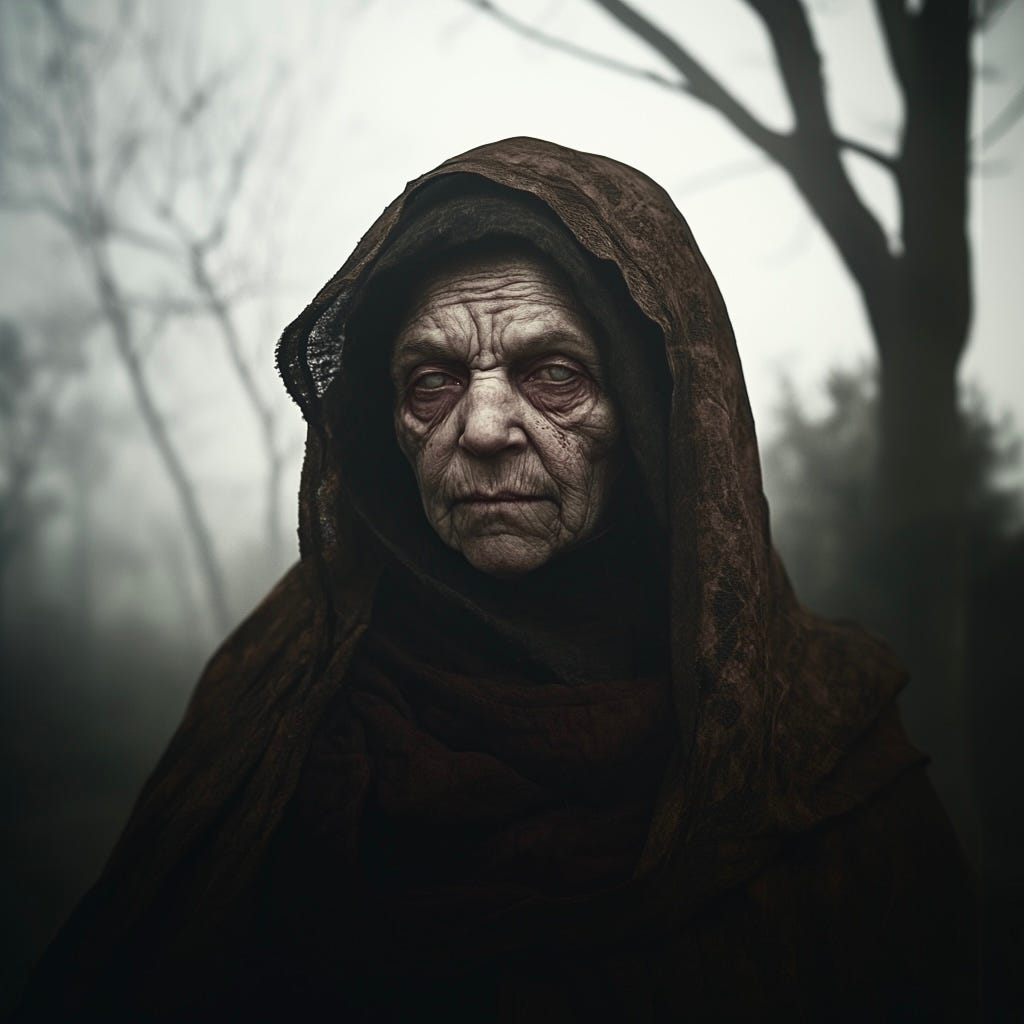

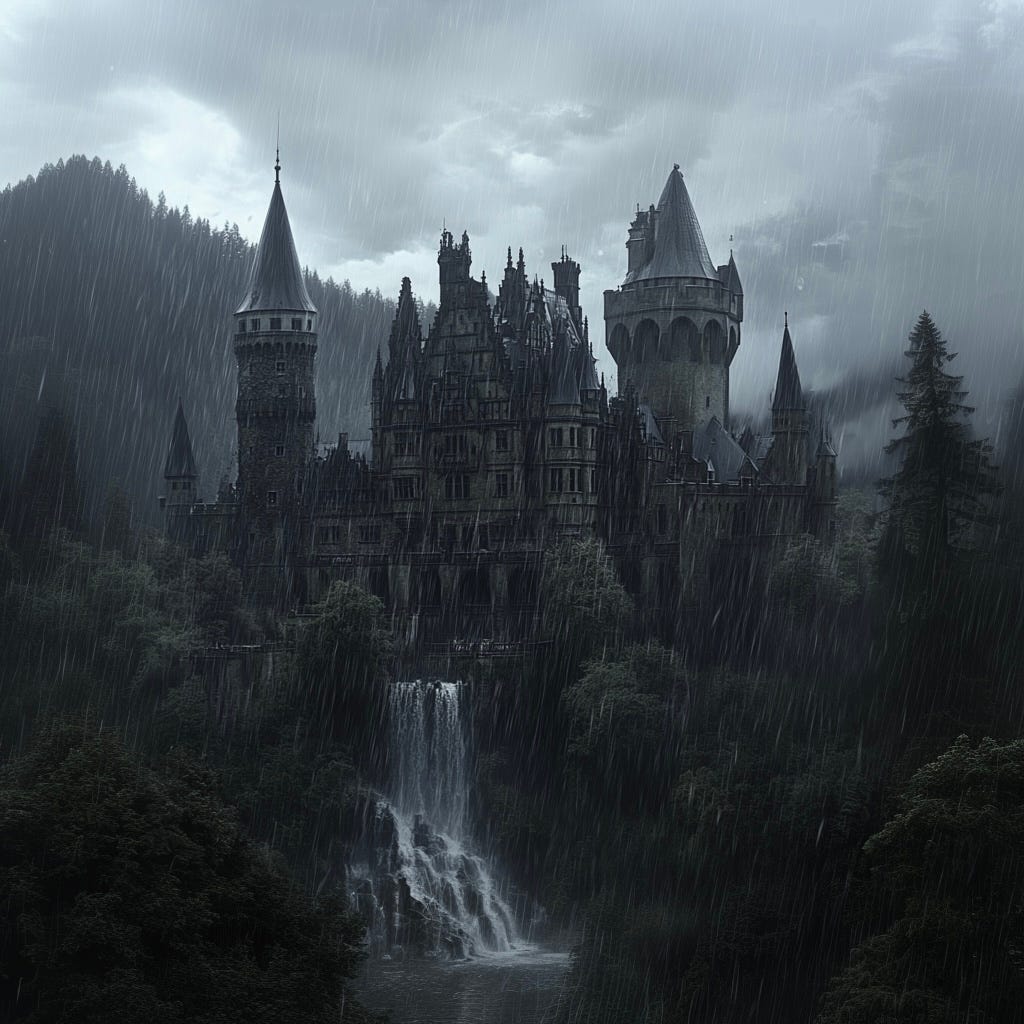

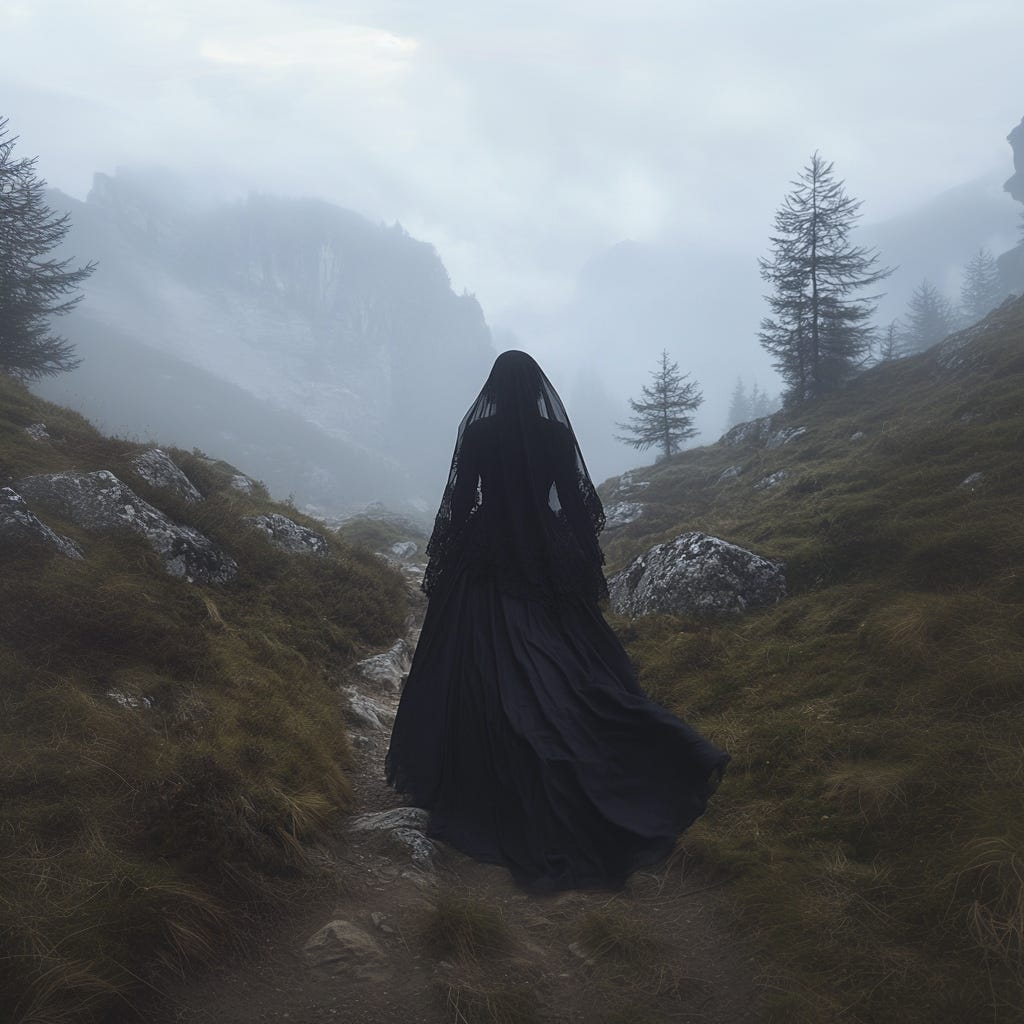
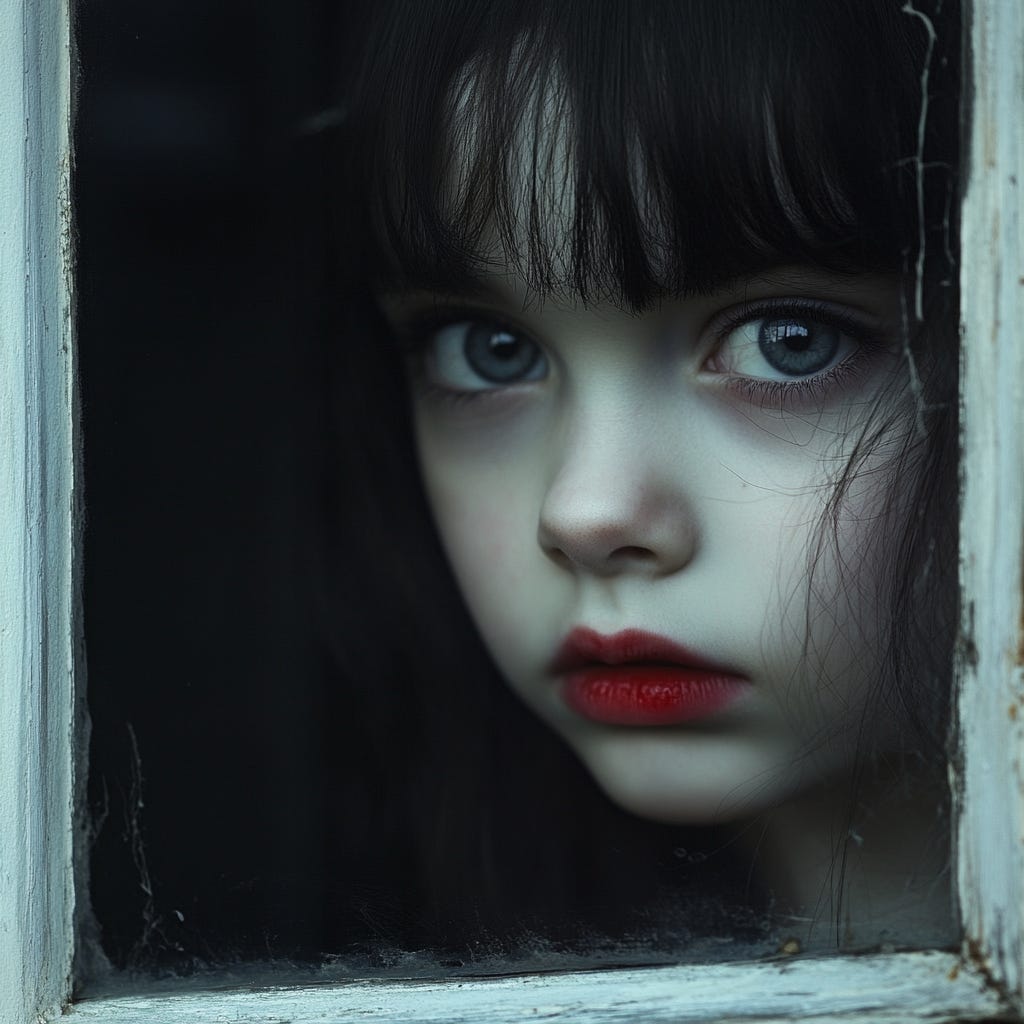
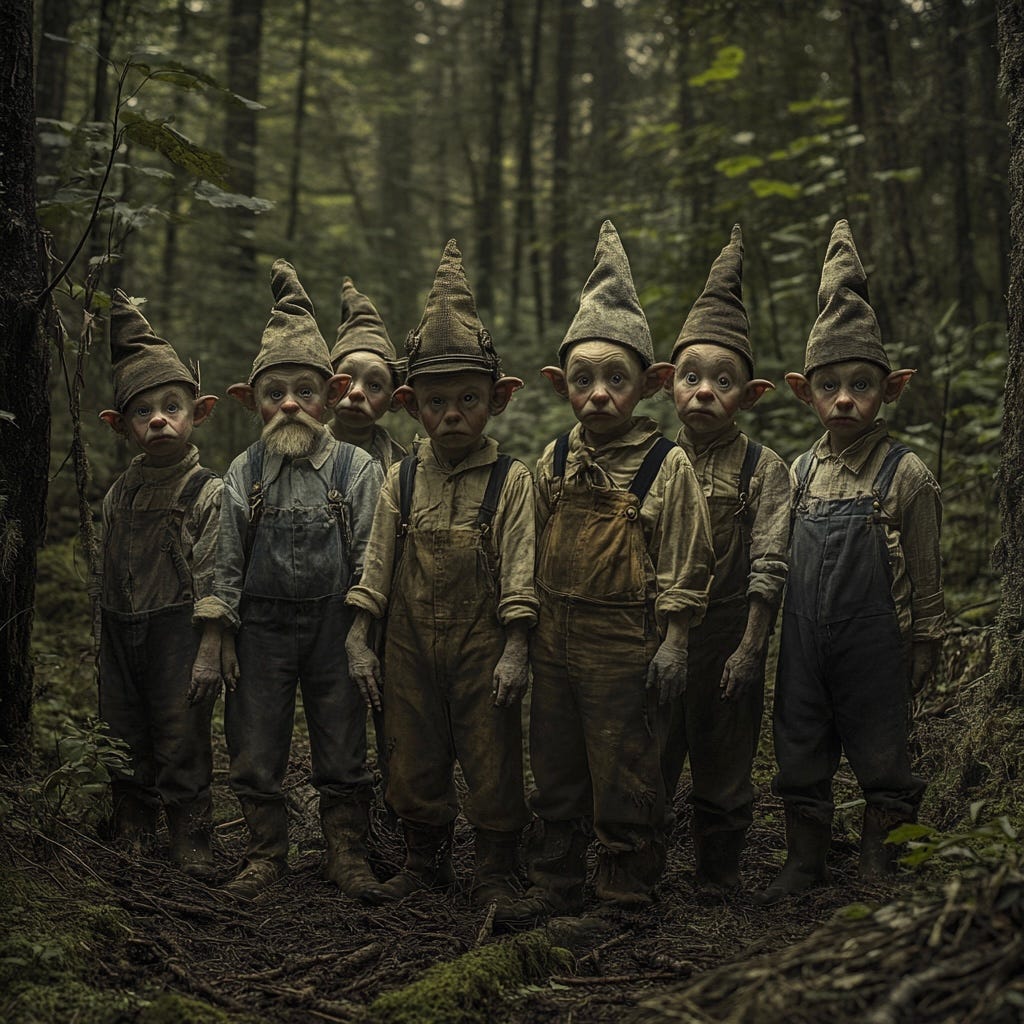
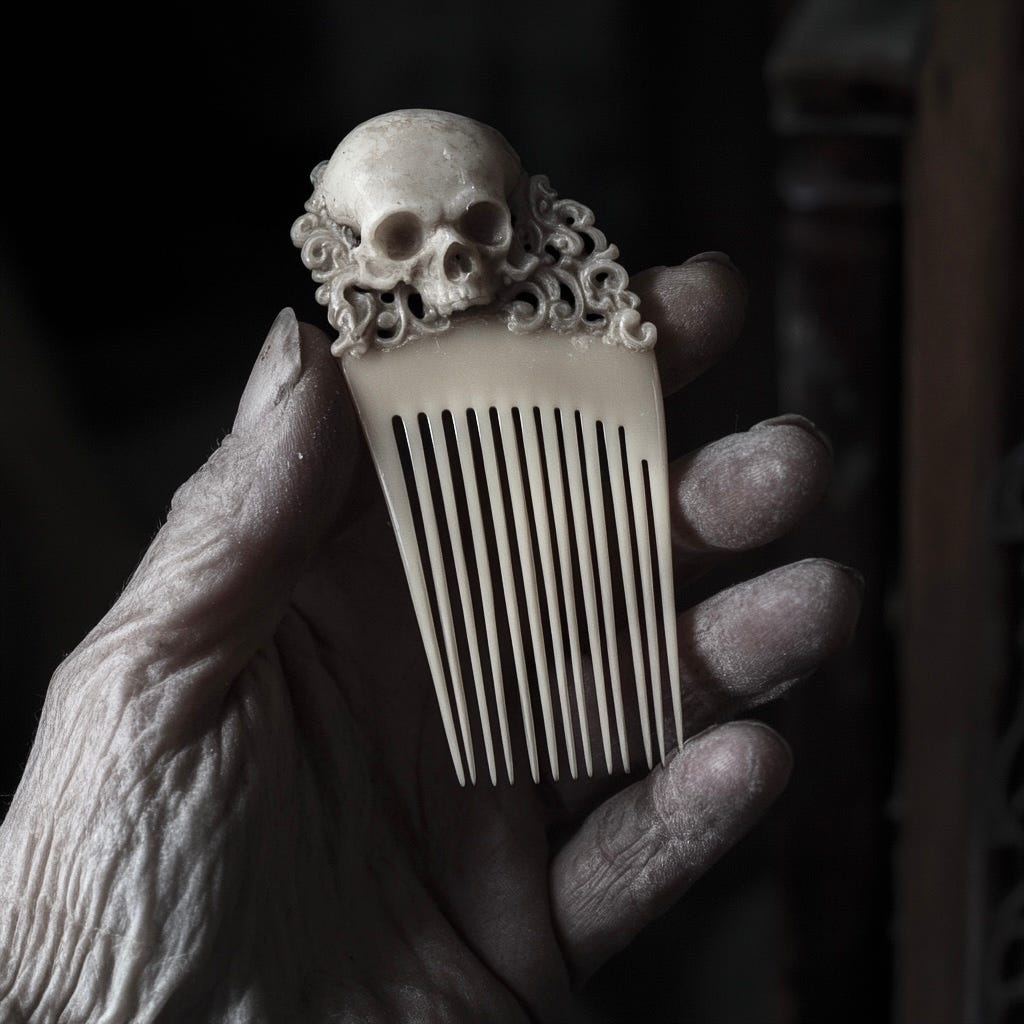
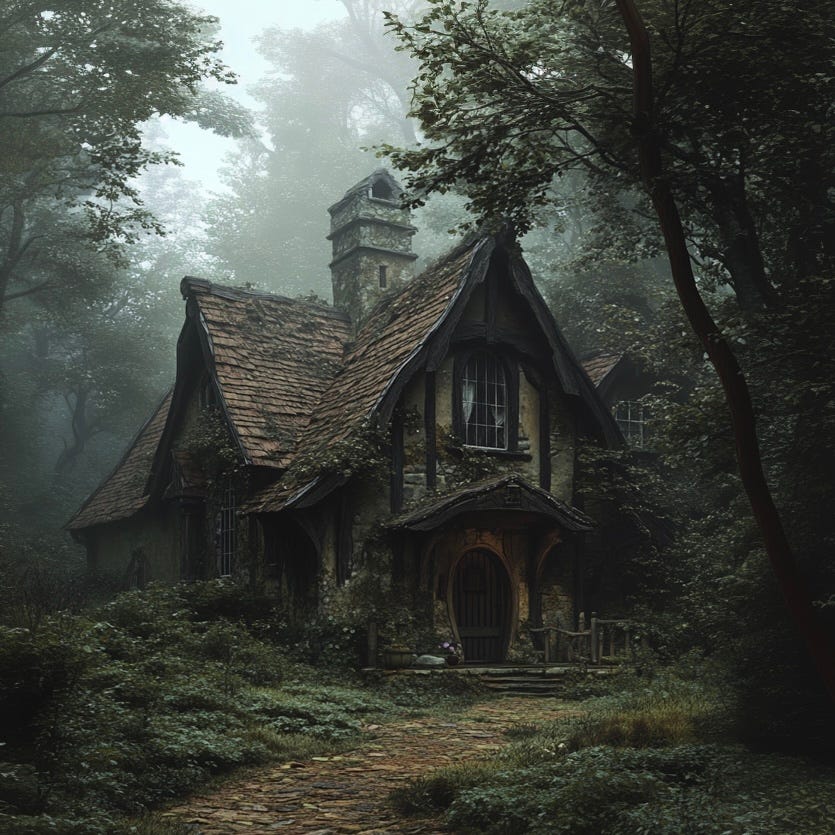
Even in the old tales, some people were too trusting to live.
You'd think that little snow white would learn the lessons of trusting strangers.
First strangled by her stays, then poisoned by the comb.
If she's not careful, it's gonna be the tomb.